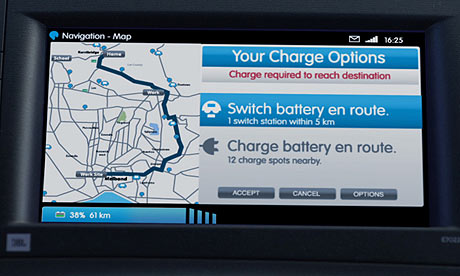- guardian.co.uk, Monday 5 April 2010 17.23 BST
- Article history

A screenshot from Better Place in-car software showing charge options during route planning. Photograph: betterplace.com
The first public trial of a system that “refills” electric cars in minutes will be launched this month. The Californian company Better Place will test its automated battery-swap stations in Tokyo.
It is the latest element in the company’s ambitious plans to build the world’s first infrastructure networks for electric cars by the start of next year.
Globally, road vehicles generate around a fifth of carbon dioxide emissions. The figure is the same for the UK. According to a study for the Department for Transport, widespread adoption of electric vehicles with a range of 30 miles or more could halve road transport emissions.
One of the biggest challenges, however, to the large-scale implementation of electric cars is the problem of infrastructure for recharging.
Better Place has come up with a model that involves building networks of charging points and battery-switch stations. At these a robotic mechanism will swap the empty battery in a car for a fully charged one. This means electric cars can be “refilled” in minutes, rather than taking several hours to charge their batteries.
On 26 April in Tokyo Better Place will begin the first public trial of its battery-switching stations. “We’re applying the switch technology to taxis and working with Tokyo’s largest taxi operators, Nihon Kotsu,” said Better Place. The trial is expected to last for 90 days.
The first part of Better Place’s technology, a network of 100 public charging points, is already being trialled in Copenhagen. Using data from the trials, Better Place will launch its first commercial network in Israel at the end of the year.
“All of our components will be tested together with the Renault Fluence electric vehicles. There will be 10 cars this year, and as we work out the kinks in the system we’ll scale up by bringing in additional vehicles and deploying additional infrastructure,” the company said.
Further cars will be introduced as the network is built up in size. Electric Renault Fluence cars will be available for consumers to buy by the end of next year and Better Place expects to be able to serve several other makes of car as long as their batteries are easily swappable by its robots.
How consumers will pay for Better Place’s services is yet to be worked out but Jason Wolf, a business manager at the company, has said that users would probably pay a monthly subscription for unlimited access, or a one-off fee for casual users.
Better Place has raised about £460m in investment in the past three years and has signed deals with Israel, Denmark, Australia and Hawaii and California to build trial networks of its electric vehicles and charging infrastructureWestminster has expressed interest in the Better Place model but has not committed to it, instead backing a more general £250m scheme including trials of a range of cars and charging infrastructures.
